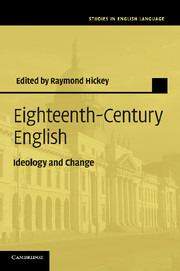Book contents
- Frontmatter
- Contents
- List of figures
- List of maps
- List of tables
- Notes on contributors
- Preface
- 1 Attitudes and concerns in eighteenth-century English
- 2 Prescriptivism and the suppression of variation
- 3 Women's grammars
- 4 Eighteenth-century women and their norms of correctness
- 5 Lowth as an icon of prescriptivism
- 6 Queeney Thrale and the teaching of English grammar
- 7 Coalitions, networks, and discourse communities in Augustan England: The Spectator and the early eighteenth-century essay
- 8 Contextualising eighteenth-century politeness: social distinction and metaphorical levelling
- 9 Expressive speech acts and politeness in eighteenth-century English
- 10 Variation and change in eighteenth-century English
- 11 Variation in sentential complements in eighteenth- and nineteenth-century English: a processing-based explanation
- 12 Nationality and standardisation in eighteenth-century Scotland
- 13 English in eighteenth-century Ireland
- 14 Changes and continuities in dialect grammar
- 15 ‘Be pleased to report expressly’: the development of a public style in Late Modern English business and official correspondence
- 16 Registering the language – dictionaries, diction and the art of elocution
- Timeline for the eighteenth century
- References
- Late modern English language studies
- Indexes
3 - Women's grammars
Published online by Cambridge University Press: 06 December 2010
- Frontmatter
- Contents
- List of figures
- List of maps
- List of tables
- Notes on contributors
- Preface
- 1 Attitudes and concerns in eighteenth-century English
- 2 Prescriptivism and the suppression of variation
- 3 Women's grammars
- 4 Eighteenth-century women and their norms of correctness
- 5 Lowth as an icon of prescriptivism
- 6 Queeney Thrale and the teaching of English grammar
- 7 Coalitions, networks, and discourse communities in Augustan England: The Spectator and the early eighteenth-century essay
- 8 Contextualising eighteenth-century politeness: social distinction and metaphorical levelling
- 9 Expressive speech acts and politeness in eighteenth-century English
- 10 Variation and change in eighteenth-century English
- 11 Variation in sentential complements in eighteenth- and nineteenth-century English: a processing-based explanation
- 12 Nationality and standardisation in eighteenth-century Scotland
- 13 English in eighteenth-century Ireland
- 14 Changes and continuities in dialect grammar
- 15 ‘Be pleased to report expressly’: the development of a public style in Late Modern English business and official correspondence
- 16 Registering the language – dictionaries, diction and the art of elocution
- Timeline for the eighteenth century
- References
- Late modern English language studies
- Indexes
Summary
Introduction
Approximately 240 new grammars of English were published during the eighteenth century (figures from Michael 1970: 277, 588–94; McIntosh 1998: 172). At least fourteen of these were written by women: the first was Anne Fisher's New Grammar, frequently republished after its first edition of 1745. Several were written for a specifically female audience: these include some written by men as well as Ellin Devis's The Accidence … for Young Ladies (1775) and Lady Fenn's The Mother's Grammar (1798). What can we infer from these facts and figures? In general, the proliferating grammatical publications remind us that vernacular education was a necessary investment for men and women who sought to profit from their culture's economic and social volatility. Moreover, by ordering English and its speakers, grammarians of both sexes participated in major Enlightenment debates, especially about the role of culture in shaping ‘nature’. Eighteenth-century women's grammars give us an even sharper perspective on British culture. As Tieken-Boon van Ostade has observed, in comparison to countries such as the Netherlands with its single female grammarian, despite cultural restrictions on women's intellectual activities, ambitious parents had sufficient interest in girls' education in eighteenth-century Britain both to inspire and to reward some authors (2000b: 879). Moreover, as Cajka has emphasised, some of the grammars written by women were as, or more, popular and influential than some of the now-canonical women's novels (2003: 244f.).
- Type
- Chapter
- Information
- Eighteenth-Century EnglishIdeology and Change, pp. 38 - 58Publisher: Cambridge University PressPrint publication year: 2010
- 8
- Cited by

